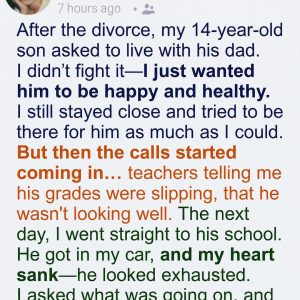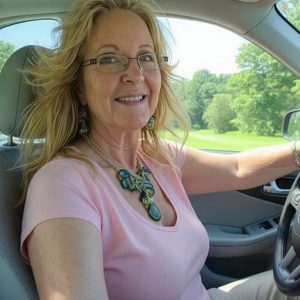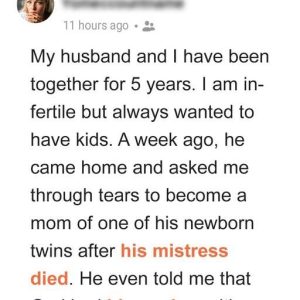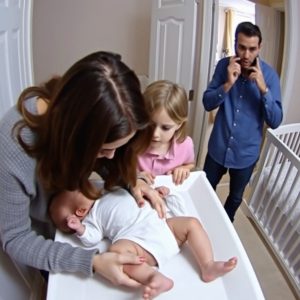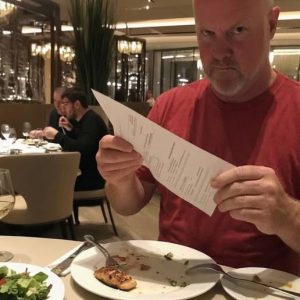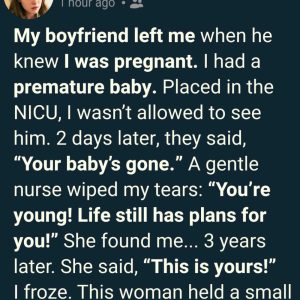The Empty Hours
There’s a specific kind of loneliness that comes at 3 AM when you’re the only one awake in a house full of sleeping people. The digital clock on the microwave casts a faint green glow across the kitchen as I sit at the table, nursing a cup of tea that’s long gone cold. Outside, rain taps against the windows in an irregular rhythm, like impatient fingers waiting for something to happen.
I should be asleep. Tomorrow—today, technically—is Thomas’s eighth birthday party. There are decorations to hang, a cake to frost, and two dozen hyperactive third-graders to corral through an afternoon of carefully orchestrated chaos. My husband Nathan and our sons sleep soundly upstairs, untroubled by the thoughts that keep me tethered to this kitchen chair night after night.
The manila envelope sits untouched at the center of the table where I placed it hours ago. The return address belongs to a laboratory in Boston, the kind that analyzes DNA and unravels the secrets written in your genetic code. Inside is the answer to a question I’ve been afraid to ask for eight years.
Is Thomas really my son?
To understand why I’m sitting here at 3 AM, terrified of an envelope, you need to know about the empty hours—the missing twelve hours from eight years ago that changed everything.
It started as a normal evening. I was six months pregnant with Thomas, my second child, and had just put four-year-old Eli to bed. Nathan was away on a business trip, due back the following afternoon. I remember feeling unusually tired, the pregnancy weighing heavily on me as I settled on the couch with a book and a cup of herbal tea.
The next thing I clearly remember is waking up in my car, parked at a rest stop more than two hundred miles from home. It was morning, around 6 AM according to the dashboard clock. My phone was dead. I was still wearing my pajamas, though I’d somehow put on shoes and a coat. My wallet and keys were in my pockets.
Twelve hours, gone.
I drove to the nearest gas station in a daze, charged my phone enough to make a call, and reached Nathan, who was frantic. He’d cut his trip short when he couldn’t reach me and had already contacted the police. Eli was with my sister, who had gone to our house when I didn’t answer my morning check-in call.
“What happened?” Nathan demanded, his voice tight with fear and confusion. “Where are you?”
“I don’t know,” I told him, the first of many times I would speak those words. “I don’t remember.”
The police interviewed me for hours. The doctors examined me for longer. Tests were run. Brain scans were taken. Blood samples were analyzed. Psychiatrists asked gentle questions about my mental health history, my stress levels, my pregnancy.
In the end, they called it a rare but not unheard-of case of pregnancy-related dissociative fugue—a temporary amnesia coupled with unexpected travel. Hormones, stress, and possibly an undiagnosed sleep disorder had combined to create the perfect storm. There was no evidence of foul play, no indication that anyone else had been involved. I had simply gotten into my car and driven away, operating on some kind of autopilot while my conscious mind checked out.
“These things happen sometimes,” the neurologist told me with a reassuring smile that didn’t quite reach her eyes. “The brain is still largely a mystery to us.”
We tried to move forward. Nathan installed a home security system that would alert him if doors opened at night. I began seeing a therapist twice a week. Eli was told that Mommy had gotten confused and taken an unexpected trip, but everything was fine now. And for a while, it seemed like it was.
Thomas was born three months later, healthy and perfect with a shock of dark hair and eyes that would eventually settle into a deep amber color. Unlike fair-haired, blue-eyed Eli, who was Nathan’s mini-me, Thomas looked different. I told myself it was because he took after my side of the family—my father had dark hair and eyes, after all.
But as Thomas grew, as his features became more defined, the nagging doubt grew with him. Nathan never said anything, but sometimes I’d catch him studying Thomas with a puzzled expression, as if trying to solve a complex equation.
It was Thomas himself who finally brought it into the open, innocent and unaware of the bomb he was dropping. He came home from school last month, a few weeks shy of his eighth birthday, with a genetics worksheet they’d completed in science class.
“Mom, how come I have these eyes when you and Dad and Eli all have blue eyes?” he asked, pointing to the section about dominant and recessive traits. “My teacher says two blue-eyed parents can’t have a brown-eyed kid. Is she wrong?”
I felt as if the floor had dropped out from under me. I mumbled something about genetics being complicated and special cases, but that night, after the boys were asleep, Nathan and I had the conversation we’d been avoiding for eight years.
“I need to know,” I told him, tears streaming down my face. “Those twelve hours—what if something happened? What if he’s not…”
“He’s our son,” Nathan said firmly, taking my hands in his. “No matter what. But if you need to know for your peace of mind, then let’s find out.”
So we ordered the DNA test, a simple kit with cheek swabs for Nathan, Thomas, and me. Nathan had taken them to the post office himself three weeks ago. And now the results were here, sitting in that manila envelope like Schrödinger’s cat—neither devastating nor reassuring until I opened it and collapsed the possibilities into a single reality.
The rain picks up, drumming against the roof more insistently. I glance at the clock: 3:17 AM. In less than five hours, I’ll need to be up making birthday pancakes, Thomas’s favorite tradition. By afternoon, our house will be full of noise and laughter and the controlled chaos of a dinosaur-themed birthday party. Life moves forward relentlessly, whether I’m ready or not.
With trembling fingers, I finally reach for the envelope.
The sound of small feet on the stairs pulls me from a restless sleep. I blink awake, momentarily disoriented to find myself still at the kitchen table, head resting on my folded arms. The envelope is gone—I vaguely remember tucking it into the bottom drawer of the desk in the study after reading its contents.
“Mom?” Thomas stands in the doorway, pajama-clad and tousle-haired, clutching the stuffed triceratops he’s had since infancy. “Why are you sleeping down here?”
I straighten, wincing at the stiffness in my neck, and hold out my arms. “Just fell asleep reading, birthday boy. Come here.”
He climbs into my lap, all gangly limbs and morning warmth. I breathe in the scent of him—sleep-warm skin and the lingering trace of the strawberry shampoo he insists on using—and hold him close.
“I’m eight today,” he announces against my shoulder, pride evident in his voice.
“You sure are,” I say, kissing the top of his head. “How does it feel?”
“The same as yesterday,” he admits after a thoughtful pause. “But also… bigger.”
I laugh, the sound rusty after my night of uncertainty. “That’s how growing up works. Little changes day by day that add up to something big.”
He pulls back to look at me, his amber eyes—so unlike mine or Nathan’s—serious and searching. “Are we still having dinosaur pancakes?”
“Of course we are. Green ones with chocolate chip spots, just like you requested.”
His face breaks into a grin that illuminates his whole face, and my heart clenches with a love so fierce it’s almost painful. This child, this beautiful boy who asks profound questions one moment and fixates on pancakes the next, is mine in every way that matters.
The DNA results had confirmed what I already knew in my heart: Nathan is Thomas’s biological father. But they also revealed something unexpected—a genetic marker that suggested I might not be his biological mother.
The phrasing was clinical, detached: “The maternal genetic markers indicate a potential exclusion of maternity, suggesting further testing may be warranted to confirm biological relationship.”
I had stared at those words until they blurred, unable to comprehend what they meant in the context of my life, my memories, my body that had grown and birthed this child. I remembered the weight of him inside me, the intense pain of his birth, the moment they placed him on my chest, red-faced and squalling. How could I not be his mother?
Unless those twelve empty hours held a truth far stranger than anything I had imagined.
“Can I help make the pancakes?” Thomas asks, breaking into my thoughts.
“Absolutely,” I tell him, pushing away the questions that have no answers. “Let’s get started before your brother wakes up and tries to change the dinosaurs into robots.”
We move around the kitchen together, Thomas measuring flour with careful concentration while I crack eggs and heat the griddle. I add green food coloring to the batter, and he insists on placing each chocolate chip “spot” with scientific precision.
“Perfect,” I declare as we admire the first triceratops-shaped pancake. “You’re a natural chef.”
“Chef paleontologist,” he corrects me seriously. “That’s what I want to be when I grow up. I’ll cook dinosaur-shaped food at my dinosaur museum.”
“That sounds like an excellent career plan,” I tell him, flipping the pancake to reveal a perfectly browned underside.
By the time Nathan and Eli join us, we’ve created a stack of green dinosaur pancakes and the kitchen smells of butter and syrup. Eli, now twelve and in the early stages of adolescent skepticism, pretends the pancakes are “lame” for approximately thirty seconds before asking for a T-Rex shaped one with extra chocolate chips.
Nathan circles his arms around my waist from behind, pressing a kiss to my temple. “You okay?” he whispers, too quiet for the boys to hear. “You look tired.”
“I’m fine,” I assure him, leaning back against his solid presence. “Just didn’t sleep well.”
He holds me a moment longer, and I know he’s wondering if I opened the envelope, what it said, how I’m feeling. But he doesn’t ask, not with the boys sitting right there, not on Thomas’s birthday.
“Need any help with party prep?” he offers instead.
“Actually, yes,” I say, grateful for the change of subject. “Can you pick up the cake from the bakery? And we need more ice for the cooler.”
“Consider it done,” he says, releasing me to pour himself coffee. “What time are the dinosaur enthusiasts arriving?”
“Two o’clock,” Thomas answers before I can. “And they’re staying until four-thirty because that’s when the volcano erupts.”
Nathan raises an eyebrow at me over his coffee cup. “Volcano?”
“Baking soda and vinegar,” I explain with a small smile. “The grand finale before cake.”
“Of course,” Nathan nods seriously. “What’s a dinosaur party without an extinction-level event?”
Thomas and Eli launch into an animated debate about whether dinosaurs could have survived the asteroid if they’d built underground bunkers, and for a moment, everything feels normal. Just a family having breakfast, planning a birthday, living their ordinary life.
But the questions from the envelope hover at the edges of my mind, impossible to fully suppress. If I’m not Thomas’s biological mother, then who is? What happened during those twelve hours I can’t remember? And most importantly—should I even try to find out the truth?
The dinosaur party is a success by any measure. Two dozen eight-year-olds excavate “fossils” (plastic dinosaurs frozen in ice cubes), assemble paper plate dinosaurs with extraordinary anatomical inaccuracies, and race each other in an obstacle course designed to mimic the Cretaceous period. The volcano eruption—a papier-mâché creation Nathan and Thomas had worked on for weeks—produces satisfyingly dramatic red foam and appropriately enthusiastic screams.
Throughout it all, I move on autopilot, snapping photos, cutting cake, mediating minor disputes, and thanking parents when they arrive for pickup. I’m present but not fully there, a part of me still sitting at the kitchen table at 3 AM, staring at the results that make no sense.
By five o’clock, the last guest has departed, and our house looks like the asteroid has indeed hit. Nathan takes one look at my face and announces he’ll handle cleanup while I rest.
“I’m taking these new LEGO sets upstairs,” Eli declares, gathering his haul of birthday presents that guests had kindly brought for the brother as well.
“Can I play in the backyard for a bit?” Thomas asks, still wearing the dinosaur party hat he’d decorated with extra stickers. “I’m not tired at all.”
“Sure, but stay where I can see you from the kitchen window,” I tell him, dropping onto the couch with a sigh of relief. “And no climbing the big tree.”
“I know, I know,” he says, already halfway out the door. “That’s a grown-up tree.”
I watch through the window as he immediately begins a complicated game that seems to involve being a velociraptor stalking prey through the jungle that is our suburban backyard. His energy is boundless, his imagination vivid. Looking at him—so vibrant, so alive, so himself—it’s impossible to reconcile with the clinical language of the DNA report.
“He had a great time,” Nathan says, sitting beside me on the couch. “You did an amazing job with the party.”
“Thanks,” I say, leaning against his shoulder. “The kids seemed to enjoy it.”
“They did.” He’s quiet for a moment, then asks softly, “Did you open it?”
I nod, unable to look at him. “It says what we expected about you. You’re definitely his father.”
“And you?”
I swallow hard. “It says… it suggests I might not be his biological mother. That further testing would be needed to confirm.”
Nathan’s arm tightens around me. “That’s impossible. I was there when you gave birth to him. I watched him come into this world from your body.”
“I know,” I whisper. “It doesn’t make any sense.”
“Could the test be wrong?”
“Maybe. But the company is reputable. Their accuracy rate is over 99%.”
We sit in silence, watching Thomas through the window as he crouches behind the garden shed, presumably preparing to pounce on an invisible dinosaur.
“What do you want to do?” Nathan finally asks.
It’s the question I’ve been asking myself since reading the results. There are obvious next steps—more comprehensive DNA testing, consulting with genetic counselors, possibly even hypnotherapy to recover those lost twelve hours. We could contact the police again, reopen the investigation into what happened that night.
But as I watch Thomas—my son, my child, regardless of what any test says—I’m seized by a powerful certainty.
“Nothing,” I say firmly. “I don’t want to do anything.”
Nathan shifts to look at me. “Are you sure? Don’t you want to know what happened?”
I consider this carefully. “Eight years ago, I would have said yes without hesitation. But now… I look at Thomas, and I know he’s my son. I carried him, I birthed him, I’ve raised him every day of his life. Whatever happened during those twelve hours, whatever the DNA says, that’s the truth that matters to me.”
“But—”
“Think about it, Nathan. If we pursue this, what’s the best-case scenario? We discover the test was wrong, and nothing changes. What’s the worst case? We uncover something that hurts Thomas, that makes him question his identity, that disrupts the happy life he has now.”
Through the window, I watch as Thomas abandons his velociraptor game and begins collecting stones from the garden path, examining each one with scientific seriousness before adding it to his pocket. His birthday hat is askew, his face smudged with chocolate from the cake, his shoelaces untied. He is perfectly, beautifully eight years old, unburdened by questions of biology or identity.
“He deserves to stay that way,” I say softly. “Innocent. Secure in who he is and who his family is.”
Nathan is quiet for a long time, his gaze following mine to our son in the backyard. “What about you? Can you live with not knowing?”
It’s a fair question. The mystery of those twelve hours has haunted me for eight years, and now the DNA results have added another bewildering layer. Can I simply set it aside? Accept that there are questions I might never have answers to?
“I think I can,” I say slowly. “Or at least, I’m willing to try. For Thomas.”
Nathan nods, his expression thoughtful. “If that’s what you want, I’ll support you. But if you change your mind—”
“I know,” I squeeze his hand. “Thank you.”
Outside, Thomas has filled his pockets with stones and is now spinning in circles, arms outstretched, face tilted toward the sky. The simple joy of it brings tears to my eyes.
“I’m going to join him,” I say, rising from the couch. “Want to come?”
Nathan smiles. “In a bit. I’ll finish cleaning up in here first.”
The air outside is cool and fresh after the stuffiness of a house filled with excited children all afternoon. Thomas stops spinning when he sees me, slightly dizzy but grinning.
“Mom! Look at my rock collection!” He pulls a handful of ordinary pebbles from his pocket, displaying them as if they’re precious gems. “This one has a fossil in it, I think. And this sparkly one might be a diamond.”
I kneel beside him, examining each stone he shows me with appropriate wonder and interest. “These are amazing finds, paleontologist Thomas. Where did you discover them?”
“In the dinosaur excavation site,” he says, gesturing grandly toward our garden path. “I think there might be more. Want to help me look?”
“I’d love to,” I tell him, my heart full.
We spend the next hour hunting for “fossils” in our backyard, Thomas narrating an elaborate story about prehistoric discoveries and scientific breakthroughs. When Nathan joins us, he’s immediately assigned the role of museum director, responsible for determining which specimens are worthy of display.
As the sun begins to set, casting long shadows across our yard, I watch my family—Nathan pretending to examine a pebble with a magnifying glass, Eli who has emerged from his room to reluctantly join our game, and Thomas directing the entire operation with the authority of a child who knows exactly who he is and where he belongs.
Whatever happened during those empty hours eight years ago, whatever biological mysteries might be locked in Thomas’s DNA, this is the reality that matters: we are a family, bound by love and shared experiences rather than simply by blood.
That night, after the boys are finally asleep, exhausted from the day’s celebrations, I retrieve the envelope from the desk drawer. Nathan finds me in the kitchen, feeding the pages one by one into the shredder.
“You’re sure about this?” he asks, no judgment in his voice.
I nod, watching the last page disappear into thin strips. “Some questions don’t need answers. Some mysteries are better left unsolved.”
He pulls me into his arms, and we stand there in the quiet kitchen, holding each other.
“Whatever happened during those hours,” he murmurs against my hair, “it gave us Thomas. And I can’t regret anything that brought him into our lives.”
“Neither can I,” I whisper, and I mean it.
Later, I step into Thomas’s room to check on him one last time before bed. He’s sprawled across his mattress, one arm flung over his head, the other still clutching his favorite triceratops. His new dinosaur LEGO sets are arranged carefully on his bedside table, ready for construction tomorrow. The moonlight streaming through his window illuminates his sleeping face, peaceful and young.
I brush a lock of dark hair from his forehead, this child of my heart if not entirely of my body. “Happy birthday, my sweet boy,” I whisper. “I love you more than you’ll ever know.”
As I turn to leave, my foot touches something on the floor—the stones he collected earlier, spilled from his pants pocket when Nathan helped him change into pajamas. I kneel to gather them, intending to place them on his desk with his other treasures.
One stone catches my attention—smoother than the others, almost perfectly round, with a peculiar iridescent sheen in the moonlight. It’s not like any rock native to our area, more like a polished river stone from a distant shore. I turn it over in my palm, feeling its weight, its strange warmth.
A flash of memory cuts through me like lightning—standing by water in the darkness, this same stone pressed into my hand by someone I can’t quite see, words spoken that hover just beyond my comprehension.
The memory is gone as quickly as it came, slipping back into the void of those twelve empty hours. I carefully place the unusual stone on Thomas’s desk, my hand trembling slightly.
Some mysteries may be better left unsolved. But others have a way of revealing themselves, whether we’re ready for their truths or not.
Spring slides into summer. Thomas turns from eight years and one day to eight years and three months. Life continues in its predictable rhythms—work and school, soccer practice and piano lessons, movie nights and Sunday pancakes.
I don’t open any more envelopes from DNA laboratories. I don’t consult hypnotherapists or reopened police investigations. I focus instead on being present with my family, on appreciating each ordinary day, each small moment.
But I keep the strange stone from Thomas’s collection. It sits on my nightstand where I can see it when I wake, a reminder of questions unanswered, of possibilities I’ve chosen not to explore. Sometimes at night, I hold it in my palm, feeling its unexplainable warmth, wondering what secrets it might hold if objects could speak of their journeys.
It’s during one such night in late July—Thomas and Eli at sleepaway camp for the week, Nathan away at a conference—that the dream comes.
I’m driving along a dark, unfamiliar road. Rain lashes against the windshield. The wipers beat a frantic rhythm as I peer into the darkness, searching for… something. Someone. The sense of urgency is overwhelming.
A figure appears at the roadside—a woman, drenched and desperate, waving me down. I pull over without hesitation. She climbs into my car, bringing with her the scent of rain and something else—antiseptic, institutional. Hospital.
“Thank you,” she breathes, her face obscured in shadow. “I didn’t think anyone would stop.”
“Are you all right?” I ask, noting her oversized coat, the way she clutches it around herself.
“I will be,” she says. “If you can help me. Please. I need to get as far from here as possible.”
I should be afraid, should question this stranger and her urgent need for escape. But in the dream, I feel only certainty as I pull back onto the road. “I’ll help you.”
We drive in silence for what feels like hours. The stranger beside me gradually relaxes, her breathing becoming steadier. When she finally turns to face me, I can see her clearly for the first time.
She looks startlingly like me—same heart-shaped face, same nose, similar mouth. But her hair is darker, and her eyes… her eyes are that familiar amber color I see in Thomas’s face every day.
“I don’t have much time,” she tells me, her voice quiet but steady. “They’ll be looking for me. For us.”
Only then do I notice what she’s holding beneath her coat—a bundle, small and carefully wrapped. A baby.
“His name is Thomas,” she says, drawing back the blanket to reveal a sleeping newborn with a shock of dark hair. “After our grandfather.”
Our grandfather. The words echo in my mind as dream-understanding blooms. This woman is my sister. My twin. The one I never knew existed.
“They told me you died,” she continues, tears streaming down her face. “They told our parents we were stillborn. But they lied. They kept us, studied us. All these years… I only found out the truth when I got pregnant. They were going to take him too.”
I can’t speak, can only listen as this dream-sister tells an impossible story of separation, experimentation, escape.
“You’re the only one I could find,” she says, her desperation palpable. “The only family I have left. I need you to take him, to keep him safe. I’ll lead them away, make them think he’s still with me. But you—they don’t know about you. You can give him a normal life.”
“I don’t understand,” I finally manage. “How did you find me?”
Her smile is sad, knowing. “We’ve always been connected. Even when we didn’t know it. Haven’t you felt it? The emptiness? The sense that part of you was missing?”
And I had. All my life, a hollow space inside that nothing ever quite filled. Until…
“If I take him, what happens to you?” I ask, though I think I already know the answer.
“I’ll disappear,” she says simply. “Change my name, my appearance. Start over somewhere they’ll never find me. And maybe someday, when it’s safe…”
She doesn’t finish the thought. Doesn’t need to.
We’ve reached a rest stop, empty and quiet in the pre-dawn hours. She carefully transfers the sleeping baby to my arms, showing me how to support his head, how to hold him securely against my body. It feels right, as if he belongs there.
“There’s something else,” she says, reaching into her pocket. She presses a smooth, round stone into my palm. “Keep this with him. It’s from the beach where our parents met. The only thing I have from them.”
I close my fingers around the stone, feeling its strange warmth. “I’ll protect him with my life,” I promise. “And I’ll wait for you. No matter how long it takes.”
She leans forward, pressing her forehead against mine in a gesture that feels ancient, familiar. “Sister,” she whispers. “Thank you.”
Then she’s gone, disappearing into the rainy darkness, leaving me with the child who is not mine and yet somehow is—my nephew, my blood, the son of my lost twin.
I wake with a gasp, the dream so vivid that for a moment I’m disoriented, expecting to find myself in a car at a rest stop rather than in my bedroom. My hand is clenched around something—the stone from Thomas’s collection, which I must have fallen asleep holding.
It glows faintly in the darkness, a soft blue luminescence that fades even as I stare at it. I blink, convinced I’m still partially dreaming, but the stone is just a stone again—unusual but ordinary, not a magical object but simply a smooth river rock.
I set it back on my nightstand with trembling fingers, my mind racing. It was just a dream, I tell myself. A creation of my subconscious, weaving together my anxieties about Thomas’s DNA results, my own life-long feelings of inexplicable loneliness, and the mysterious stone into a narrative that makes a strange kind of sense.
And yet…
The lost twelve hours. The DNA results showing Thomas is not biologically mine, yet Nathan is his father. The stone that feels warm to the touch, that triggered a flash of memory I can’t fully access.
Could it be more than a dream? Could it be a memory trying to surface?
I reach for my phone, opening a browser window before I can talk myself out of it. I search for: “twins separated at birth research studies.”
The results load slowly, my rural internet struggling in the middle of the night. Articles about the Minnesota Twin Study, about twins raised apart who share uncanny similarities, about the nature versus nurture debate. And then, about ten results down, a headline that makes my blood run cold:
“Government Investigation Uncovers Illegal Twin Study at Lakewood Research Facility, 1980-1999”
The article is from a small regional newspaper, dated fifteen years ago—around the time I was in college, too busy with exams and campus life to pay attention to obscure news stories. I scan it quickly, my heart pounding:
“…separated twins at birth without parental knowledge or consent…” “…told parents the other twin had died…” “…studied developmental differences between twins raised in different environments…” “…multiple lawsuits filed by affected families…” “…records sealed by court order, identities of subjects protected…”
Lakewood Research Facility. The name means nothing to me, and yet it sends a shiver down my spine. I search for it specifically, finding only sparse information—a private research institution in the Pacific Northwest, closed in the early 2000s after investigations into ethical violations, most records sealed by court order.
I was born in Seattle. My parents moved to the East Coast when I was barely a year old. They never spoke much about that time, and both died in a car accident when I was twenty-two, taking whatever secrets they might have known with them.
Could I have been part of this study? Could I have a twin sister I never knew existed? It seems impossible, something out of a science fiction movie rather than real life. And yet, the DNA results, the dream, the strange stone…
I set my phone down, my mind whirling with possibilities both fantastical and terrifying. If the dream contains elements of truth—if I do have a twin sister who gave me her child to protect him—then what happened to her? Is she still out there somewhere, hiding, waiting until it’s safe to return? Or did those she was running from find her after all?
And what about Thomas? Should I tell him someday that I might be his aunt rather than his mother? That the woman who gave birth to him made the ultimate sacrifice to keep him safe? How would such knowledge shape his understanding of himself, of his place in the world?
Questions without answers spiral through my mind as the night stretches on. By the time dawn breaks, I’ve made no decisions, reached no conclusions. But I’ve acknowledged a possibility I’ve been avoiding for months: that the truth about those twelve empty hours might be both simpler and more complex than I’ve imagined.
Perhaps I didn’t drive away in a hormone-induced fugue state. Perhaps I was answering a call I didn’t consciously hear, responding to a connection I didn’t know existed. Perhaps somewhere deep inside, I recognized my sister’s need, felt her fear, and acted without understanding why.
I place the stone back on Thomas’s desk before he returns from camp, watching as he rediscovers it among his collection of ordinary pebbles.
“This is my favorite,” he tells me, holding it up to the light. “It feels special.”
“It is special,” I agree, smoothing his dark hair away from his amber eyes—eyes that might belong to a woman I’ve only met in dreams, a sister I may never know. “Take good care of it.”
“I will,” he promises solemnly. “Forever and ever.”
I don’t pursue the scattered threads of possibility. I don’t contact authorities about long-closed investigations or search for women who might be my twin. I don’t order more DNA tests or consult with genetic specialists.
Instead, I watch Thomas grow, noting each similarity and difference, each trait that might come from me or Nathan or someone else entirely. I hold the possibility of another truth gently, neither accepting nor rejecting it fully, allowing it to exist alongside the reality of our daily lives.
And sometimes, late at night when the house is quiet and my thoughts are loud, I hold the stone—which Thomas eventually returns to me, saying, “I think it wants to be with you, Mom”—and I whisper into the darkness:
“Wherever you are, thank you. He’s safe. He’s loved. And if you’re out there, we’re waiting.”
Perhaps it’s nothing but a dream, a story my mind created to make sense of inexplicable results and missing hours. Perhaps Thomas is biologically mine after all, the DNA test a rare error, the dream merely a product of anxiety and imagination.
But perhaps there’s another explanation, one that science and logic can’t fully account for. Perhaps somewhere, a woman with my face and Thomas’s eyes is living a hidden life, thinking of the child she gave up to protect, watching the horizon for a sign that it’s finally safe to come home.
I may never know for certain. The twelve hours remain empty, a blank space in my memory that neither doctors nor hypnotherapists nor DNA tests can definitively fill. But in that emptiness, I’ve found a strange kind of peace—an acceptance that some mysteries aren’t meant to be solved, only lived with.
Thomas is nine now, then ten, then twelve—growing taller, more independent, more himself with each passing day. His amber eyes, so unlike mine or Nathan’s, view the world with curiosity and intelligence. The questions about his genetic traits have faded as his personality and interests have emerged more strongly—his scientific mind, his artistic talent, his quiet compassion for others.
He is my son, regardless of biology, regardless of what did or didn’t happen during those empty hours. That truth transcends DNA tests and dream-memories, hospital records and smooth river stones. It’s written in bedtime stories and birthday pancakes, in soccer games and science projects, in all the ordinary moments that build a life together.
And if someday a woman appears on our doorstep, with my face and Thomas’s eyes, I will open the door and say, “We’ve been waiting for you. Welcome home, sister.”
Until then, I live in the fullness of the present, grateful for each moment with my family, for the mystery that may have brought us together, and for the love that keeps us that way—a love stronger than blood, deeper than memory, and more enduring than any question left unanswered.
THE END

